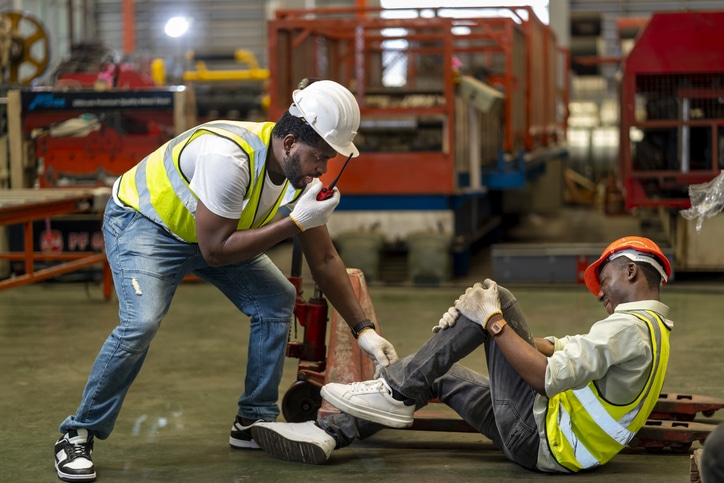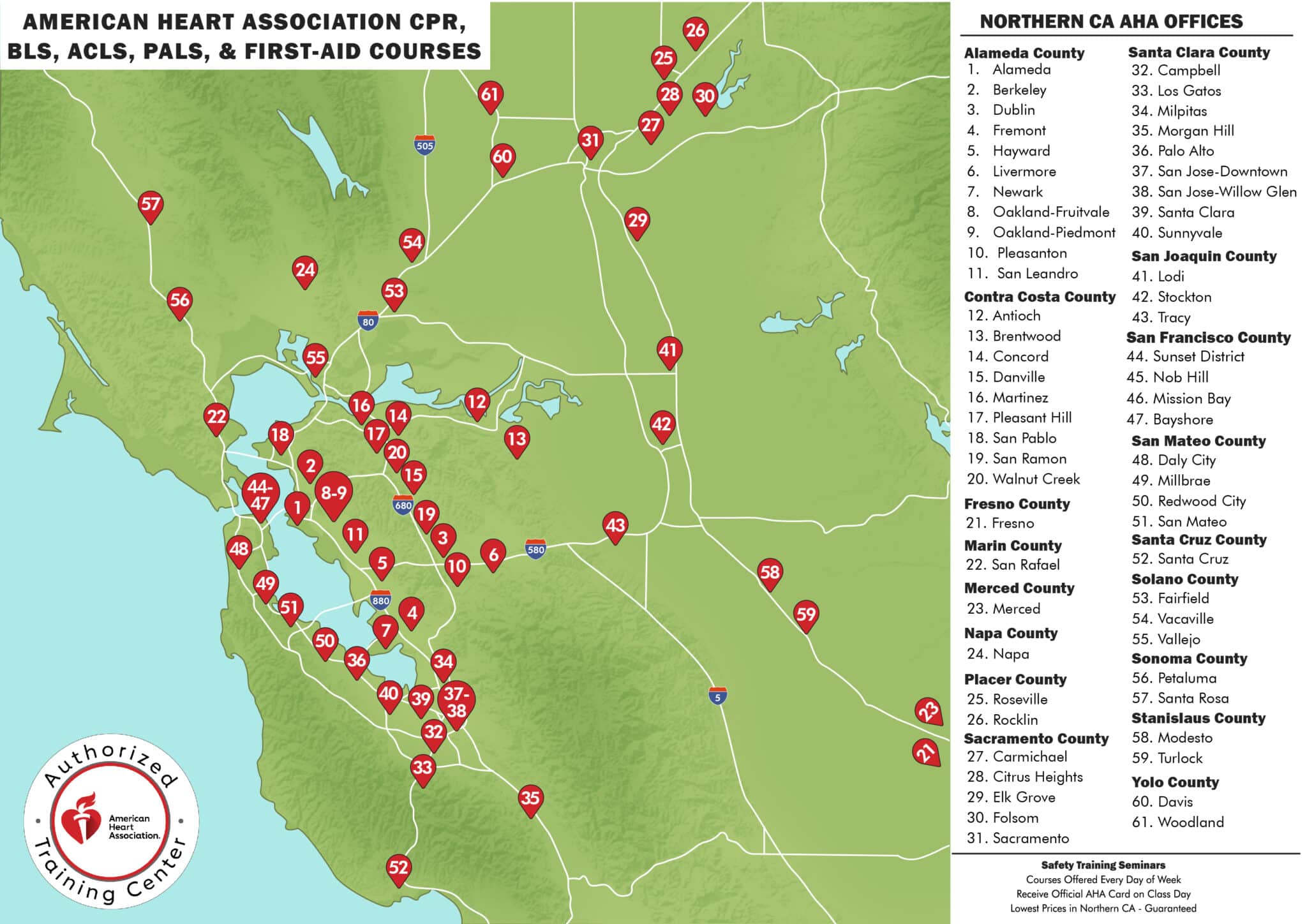American Heart Association© CPR & First-aid Classes in Fremont

CPR, AED, And First-aid
Course Name: CPR, AED, and First-Aid Training
Course Length (Online): Approximately 2 hours (complete from the comfort of your home)
Skills Testing: 30–50 minutes at a designated CPR testing site
What You’ll Learn:
- CPR techniques for all age groups
- Proper use of an AED (Automated External Defibrillator)
- First-aid basics for bleeding, burns, seizures, epi-pen usage, and more
Course Details:
- Price: $89 (Includes Safety Training Seminars certification card)
- When: Available Monday through Sunday, with flexible class timings throughout the day
- Where: Classes are offered in over 60 locations across Northern California
- Certification Card: Issued on the same day of your skills testing
Why Choose Us?
- Low Price Guarantee: Find a cheaper rate? We’ll match it!
- Convenient Locations: Choose from multiple Northern California cities near you.
- Fast Certification: Learn essential skills and leave with your card the same day.
View CPR & First-aid Courses in Fremont & Other Cities Near You

Equipped for Emergencies: CPR & First-Aid Certification Classes in Fremont
Emergencies can strike unexpectedly, but being prepared to respond can make all the difference. In Fremont, California, CPR & First-Aid certification classes offer residents the opportunity to gain essential life-saving skills. This article delves into the importance of CPR & First-Aid certification, the availability of classes in Fremont, and the significant impact these courses have on community safety and well-being.
The Significance of CPR & First-Aid Certification
CPR (Cardiopulmonary Resuscitation) and First-Aid certification are foundational skills that empower individuals to provide immediate care in medical emergencies. CPR involves chest compressions and rescue breaths to maintain blood circulation and oxygenation in someone experiencing cardiac arrest. First-Aid encompasses various basic medical interventions aimed at stabilizing injuries or illnesses until professional medical help arrives.
Certification in CPR & First-Aid ensures individuals have received proper training and are proficient in these critical skills. Whether administering CPR, using an automated external defibrillator (AED), or applying bandages and splints, certified responders can act swiftly and decisively in emergency situations. Moreover, CPR & First-Aid certification instills confidence and readiness to respond effectively, making communities safer and more resilient.
The Availability of CPR & First-Aid Certification Classes in Fremont
Fremont residents have access to CPR & First-Aid certification classes through various organizations and training centers. The American Heart Association (AHA), the Red Cross, local healthcare facilities, and private training providers offer a range of courses tailored to different audiences, including healthcare professionals, workplace employees, educators, childcare providers, and the general public.
These classes cover essential topics such as adult, child, and infant CPR techniques, relief of choking, basic airway management, wound care, and recognition of medical emergencies. Participants learn through classroom instruction, hands-on practice, and simulated scenarios, allowing for the application of theoretical knowledge in real-life situations. Moreover, CPR & First-Aid certification classes are offered in flexible formats, including in-person sessions, blended learning options, and online courses to accommodate varying schedules and learning preferences.
The Impact of CPR & First-Aid Certification on Community Safety
The impact of CPR & First-Aid certification extends beyond individual responders—it enhances community safety and resilience as a whole. By equipping residents with the skills to respond effectively to medical emergencies, these certification classes create a network of trained responders who can intervene promptly in life-threatening situations. This network becomes an invaluable resource in emergencies, complementing the efforts of professional first responders and increasing the likelihood of positive outcomes for victims.
Moreover, CPR & First-Aid certification fosters a culture of preparedness and empowerment within the community. Individuals who undergo training not only gain the ability to respond to emergencies but also become advocates for safety and well-being in their homes, workplaces, and social circles. They share their knowledge, encourage CPR & First-Aid training, and champion initiatives aimed at creating safer environments for all.
The Importance of Recertification and Ongoing Training
While obtaining CPR & First-Aid certification is crucial, maintaining proficiency through recertification and ongoing training is equally important. CPR guidelines and first-aid protocols evolve over time, reflecting advances in medical science and best practices. Recertification courses provide updates on the latest techniques, equipment, and guidelines, ensuring that skills remain current and effective.
Furthermore, ongoing training allows certified responders to refine their skills, build confidence, and stay prepared to handle a wide range of emergencies. Regular practice sessions, skill drills, and participation in continuing education opportunities help individuals maintain their readiness to respond effectively in crisis situations. By prioritizing recertification and ongoing training, Fremont residents can ensure they are always prepared to act as capable first responders when needed most.
Conclusion
In Fremont, California, CPR & First-Aid certification classes play a vital role in fostering a safer and more resilient community. By equipping individuals with the knowledge and skills to respond effectively to medical emergencies, these classes empower residents to become equipped first responders. Through collaboration, education, and advocacy, Fremont continues to prioritize community safety and well-being, ensuring that every resident has the ability to make a life-saving difference when it matters most.
FAQs
Who should attend CPR & First-Aid certification classes in Fremont?
CPR & First-Aid certification classes are suitable for anyone who wants to learn life-saving skills, including parents, teachers, caregivers, healthcare professionals, and members of the general public.
How long does a CPR & First-Aid certification course typically last?
CPR & First-Aid certification courses usually span over one to two days, depending on the training provider. The course includes a combination of classroom instruction, skills practice, and hands-on demonstrations.
Is there a renewal requirement for CPR & First-Aid certification?
Yes, CPR & First-Aid certifications are typically valid for two years, after which individuals are required to undergo renewal courses to maintain their certification. Renewal courses often include updates on guidelines and practice of skills.
